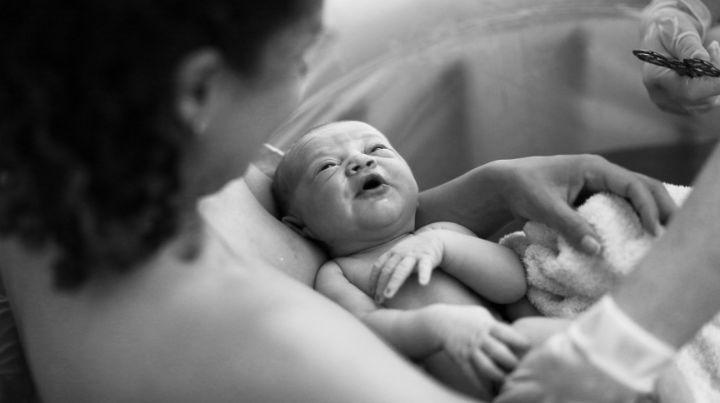Disaster Pregnancy Prepping

In a perfect world, every baby would be born to parents with a full range of birthing options. Babies would come predictably enough that parents could simply plan on getting to their obstetric care provider in time without worrying about any other pregnancy preps.
But we don't live in a perfect world. Babies have never been predictable, and when it comes to maternity care, the situation in the U.S. is moving in the wrong direction. Maternity wards across the country are closing, particularly in rural areas.
Loss of access to maternity services during disasters is a possibility as well. Hurricanes and wildfires don't change course because of someone with a birth plan. As long as there are people, babies will show up, too.
Coming up with an ideal birth plan is important. New mothers and fathers need to have these discussions. But it's good to have backup pregnancy preps, too, in case something happens that you can't control and you find yourself laboring in a less-than-ideal setting.
My Experience
My first child was born in a hospital because I assumed all babies were born in hospitals. I had a Caesarean. The pain medication did not work properly, so the next time, I found a certified nurse-midwife who delivered babies at home. After being told I was too small to deliver naturally at the hospital, I had two babies even larger than the first safely at my home.
I'm not going to suggest every woman plans a homebirth. That's a very personal decision. I am just going to share what I learned to help my second and third births go more smoothly and progress without surgical intervention.
General Fitness
The most important thing to do in preparing while pregnant is to make sure you're properly nourished. Proper nourishment is so important that my midwife would actually not work with vegans. There is not much that can screw up childbirth like malnutrition can, and insufficient protein killed many women before the modern era. My great-grandmother died in childbirth due to toxemia, correlated with a protein deficiency.
More recent studies indicate that pregnant women need 1.22 grams of protein per kilogram of weight for the first half of their pregnancy and 1.52 grams per kilogram for the second half. So, a woman weighing 150 lbs (or 68 kg) would optimally have about 83 g of protein per day in the first half of her pregnancy and about 103 g per day in the second trimester.
And you'd want to get this from relatively high-quality foods, not lots of processed foods such as deli meats. High quality doesn't have to mean expensive. But it can mean having 2 or 3 eggs for breakfast instead of cereal or pastries. For snacks, think full-fat yogurt or fruit with peanut butter. Chicken salad sandwiches are an easy lunch, too. Think high-protein, full-fat foods that will satisfy you, rather than snacks like pretzels or chips that don't contain many nutrients. Your doctor will probably recommend an iron supplement.
If you're unsure whether you're getting enough protein, you could keep a diet chart, writing down what you eat every day. This can help you find areas of potential improvement.
Moderate exercise is also important. Should you be doing Parkour? Probably not. But walking daily goes a long way toward keeping you mobile and strong for labor.
Labor is an athletic endurance event for many women. With both of my home-birth children, I labored for about a day. You wouldn't train for a marathon by laying around and eating ice cream; you shouldn't prepare for childbirth that way, either. Unless your doctor specifically puts you on bed rest, staying mobile will help you make it through labor.
Mental Preparedness
We live in a culture that attaches a lot of fear to childbirth. Think about births on TV; they're usually dramatic events in which the doctor rushes in to save the day. Most of us grew up hearing about how women died in childbirth all the time before modern medicine.
And I don't want to knock the benefits of modern medicine, but up until 100 years ago, many people were half-starved and living in unsanitary conditions, too. It's important to remember that birth is a natural process that's been going without surgeons for a long, long time.
Reading birth stories may help reduce some of the fear surrounding birth. Ina May's Guide to Natural Childbirth contains many birth stories and a great deal of practical medical information. Ina May's Spiritual Midwifery also includes a lot of birth stories. Henci Goer's The Thinking Woman's Guide to a Better Birth is another good one.
Watching natural birth videos can help a lot, too. Just make sure you're conscious of your surroundings before watching them! They can get intense. But it'll begin to seem normal once you watch enough videos to get past the “yuck” factor. And that is the mindset that you want before your own day comes.
You'll notice some interesting differences between natural birth videos and birth, as it usually occurs on TV shows. The biggest difference is probably that most women do not lie on their backs. Louis XIV began this practice because he liked watching his mistresses give birth; there's nothing natural about it.
Doctors in hospitals like this position because, again, it gives them a nice view. But if you go into labor and you're not near a hospital, you may as well find what feels best. Historically, women typically gave birth squatting, standing, sitting, or kneeling on all fours. I gave birth to one large baby standing and one even larger baby kneeling, and barely needed stitches. Finding a comfortable position to push from makes that much of a difference.
Pregnancy Preps: Equipment
If you are seriously concerned about not getting to a hospital in time, you should probably keep certain supplies in your vehicle. You should have a good First Aid kit in your vehicle anyway, but in addition to that, you will also want:
- Old shower curtain
- 1 or 2 pillows
- Old towels
- Puppy pads
- Large overnight pads
- Pain reliever
- Water/electrolyte drinks
- High-protein snacks (think tuna pouches or peanut butter)
- Extra clothes for mom and baby
- Diapers
- Baby Blanket
- Heavy-duty trash bag (for soiled items)
- Heavy kitchen bags (for placenta)
- Cord clamp for umbilical cord
- Medical scissors (should be in your First Aid kit)
- Cotton balls
- Flashlight with extra batteries
Babies show up when they show up. I had a friend who delivered her third baby with her shoes on, squatting on top of a gurney in the emergency room. I met a couple from the Philippines whose baby came out in the kitchen. The husband told us his mother-in-law was at the house and calmly talked the wife through everything.
I asked what he was doing at this time.
“I was running around the house screaming,” he said promptly. But between his wife and her mother, the baby was fine.
Final Thoughts
I'm not trying to push natural births or home births for everyone here. I know that's not always realistic. But I do think that women, regardless of their birth plan, can learn from the birth experiences of others, especially if they are not in an ideal birthing situation themselves.
It's a shame that maternity wards are being closed in so many places. It's a shame that women often feel like they don't have many choices regarding their birth settings. I was fortunate in that I lived in a large metro area, close to a hospital, with a variety of options, when my children were born. I was able to find a skilled midwife whose values aligned with my own and who was able to guide me through very satisfying births. But this just isn't an option for many people.
If you are far from a hospital, if you do not have a doctor or midwife who can give you a lot of time and attention, or if you are prepping for a potential pregnancy during a SHTF event, I strongly recommend reading a lot of books with natural birth stories, even if you are not planning a natural birth! Why? Because they make birth seem like a normal process, they dispel fear.
Childbirth is a major turning event in a person's life; you give birth to a baby, but you're giving birth to a new version of yourself, too. When that baby comes out, you're now a parent on top of all the other things you were before.
Like every big change, foresight and preparedness can go a long way toward gracefully making that change. Hopefully, even if you have to give birth in a less-than-ideal setting, the right mindset and preparation can help you and your new family thrive.
Additional Resources:
Related Articles
FREE Guide
Read the Best Seller
Join Mind4Survival
Stay informed by joining the Mind4Survival! 100% Secure! 0% Spam!
Affiliate Disclosure...
Mind4Survival is a free, reader-supported information resource. If you make a purchase through our link, we may, at no cost to you, receive an affiliate commission.
Do You Want To Be Ready No Matter What?

Download our free 39-page guide with interactive, 7-Day Emergency Kit Checklist and take the first step toward real preparedness.
- Know exactly where to start.
- Save time and money.
- How-to build a complete Basic Emergency Kit.
- Level up your safety and security.
Join Mind4Survival
Stay informed by joining the Mind4Survival! 100% Secure! 0% Spam!








Since America is trashed ,never to return to normal like the 1980’s for example, several women I know opted for a child free lifestyle and had permanent birth control surgery. Who in their right mind would want to raise children today with no future. America will not return to normal as agenda 2030 is planned and not enough men with spines to stop it in this country. Everyone will be monitored and controlled like slaves.